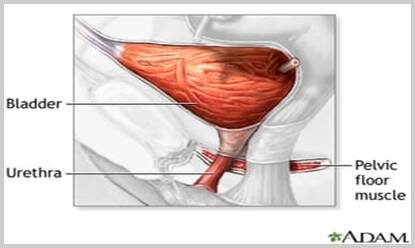
Bladder Cancer
Bladder cancer is a condition that affects the bladder, the organ that stores urine. There are different types of bladder cancer. The most common form develops in the cells on the inner lining of the bladder wall. If the cancer spreads through the lining into the muscle layers of the bladder, it is considered an invasive cancer. The majority of cases of bladder cancer are diagnosed at an early stage when they are highly treatable. It will require frequent followup and surveillance.
Types of Bladder Cancer
Bladder cancers, which are named for the kinds of cells that the tumors grow in, mainly fall into one of the following three categories.
Transitional-Cell Carcinoma
Transitional-cell carcinoma develops in cells that make up the inner lining of the bladder. It is the most common form of bladder cancer.
Squamous-Cell Carcinoma
Squamous-cell carcinoma is aun common type of bladder cancer that forms from rigid squamous cells, which resemble skin cells in shape and size.
Adenocarcinoma
Adenocarcinoma is the most rare bladder cancer. It begins in cells that make and release mucus and other fluids. Adenocarcinomas originate from cells that have gland-like or secretory properties.
Risks Factors for Bladder Cancer
The exact cause of bladder cancer is unknown, but there are risk factors associated with its onset. They include the following:
- Smoking (current or in the past, or second hand exposure)
- Increase in age
- Being male
- Being Caucasian
- Family history of cancer
- Exposure to carcinogens or cancer-causing substances
- Previous cancer treatments
- Previous radiation treatment in the pelvic area
Symptoms of Bladder Cancer
Symptoms of bladder cancer are similar to those of most urological conditions, and include frequent and/or painful urination; blood in the urine (either visible to you or microscopic) and pain in the back and/or pelvis. If you experience any of these symptoms, you should be evaluated by your provider
How Bladder Cancer is Diagnosed
To diagnose bladder cancer, a physician performs a physical examination looking for any abnormalities. This may include an abdominal, pelvic and/or rectal exam. There are some diagnostic tests to be ordered
- Cystoscopy (inserting camera inside of bladder through urethra to look at bladder)
- Biopsy or the bladder or resection of mass in bladder
- Imaging studies such as CT scan
- Urine testing
Stages of Bladder Cancer
Once bladder cancer is diagnosed, a determination of its stage will be made. There are four stages:
- Stage I, in which cancer has invaded the bladder's superficial inner lining but not the muscle lining
- Stage II, in which cancer has invaded the muscle layer but is still confined to the bladder organ
- Stage III, in which cancer cells have spread through the bladder wall to surrounding tissues
- Stage IV, in which cancer has spread to the lymph nodes and possible other organs
Treatment of Bladder Cancer
The various treatment options for bladder cancer vary based on the stage of the cancer, the patient's overall health and, in some cases, the patient's preference. Options include the following. It is important that the cancer is monitored frequently after diagnosis.
Surgery
Bladder cancer surgery involves the removal of the cancerous tissue. Tumors may be surgically removed from the bladder in early-stage bladder cancer, but preserving the bladder. If the cancer is far advanced and invading the muscle, some or all of the bladder may be removed (cystectomy).
Chemotherapy
With chemotherapy, powerful medications are administered to destroy cancer cells. This is generally monitored and administered through an oncologist. Chemotherapy medicine may be administered in a variety of forms, including injections, pills and catheters. For patients with bladder cancer, the drugs are usually administered directly into the bladder in a procedure called intravesical chemotherapy.
Radiation Therapy
There are different types of radiation therapy. External radiation therapy directs concentrated radiation at a tumor from outside the body. Internal radiation therapy implants radioactive material through the urethra, or through a small incision in the bladder near the cancerous tumor.
Immunotherapy
Immunotherapy is the stimulation and use of the body's own defenses to fight off cancer. It involves boosting the bladder's defensive abilities by injecting it with disease-fighting substances naturally produced by the body. Immunotherapy is only recommended when cancer is in its earlier stages and can help prevent a recurrence.
Prevention of Bladder Cancer
Although there is no way to prevent it, the risk of getting bladder cancer may be reduced by quitting smoking, eating a healthy diet, maintaining a healthy body weight, minimizing exposure to chemicals, and drinking plenty of water to stay hydrated and empty the bladder throughout the day.
